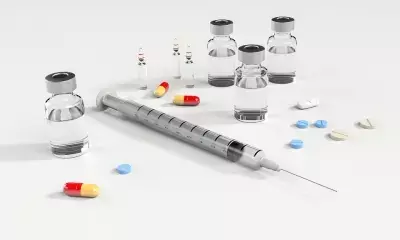- Home
- Medical news & Guidelines
- Anesthesiology
- Cardiology and CTVS
- Critical Care
- Dentistry
- Dermatology
- Diabetes and Endocrinology
- ENT
- Gastroenterology
- Medicine
- Nephrology
- Neurology
- Obstretics-Gynaecology
- Oncology
- Ophthalmology
- Orthopaedics
- Pediatrics-Neonatology
- Psychiatry
- Pulmonology
- Radiology
- Surgery
- Urology
- Laboratory Medicine
- Diet
- Nursing
- Paramedical
- Physiotherapy
- Health news
- Fact Check
- Bone Health Fact Check
- Brain Health Fact Check
- Cancer Related Fact Check
- Child Care Fact Check
- Dental and oral health fact check
- Diabetes and metabolic health fact check
- Diet and Nutrition Fact Check
- Eye and ENT Care Fact Check
- Fitness fact check
- Gut health fact check
- Heart health fact check
- Kidney health fact check
- Medical education fact check
- Men's health fact check
- Respiratory fact check
- Skin and hair care fact check
- Vaccine and Immunization fact check
- Women's health fact check
- AYUSH
- State News
- Andaman and Nicobar Islands
- Andhra Pradesh
- Arunachal Pradesh
- Assam
- Bihar
- Chandigarh
- Chattisgarh
- Dadra and Nagar Haveli
- Daman and Diu
- Delhi
- Goa
- Gujarat
- Haryana
- Himachal Pradesh
- Jammu & Kashmir
- Jharkhand
- Karnataka
- Kerala
- Ladakh
- Lakshadweep
- Madhya Pradesh
- Maharashtra
- Manipur
- Meghalaya
- Mizoram
- Nagaland
- Odisha
- Puducherry
- Punjab
- Rajasthan
- Sikkim
- Tamil Nadu
- Telangana
- Tripura
- Uttar Pradesh
- Uttrakhand
- West Bengal
- Medical Education
- Industry
Interferon may help speed up recovery of COVID-19 patients, says Study

Interferon also reduced blood levels of interleukin(IL)-6 and C-reactive protein (CRP), two inflammatory proteins found in COVID-19 patients.
Toronto: An international team of researchers has found that an antiviral drug -- interferon(IFN)-a2b -- can help speed up the recovery of COVID-19 patients.
Published in the journal Frontiers in Immunology, the study revealed that treatment with interferon (IFN)-a2b may significantly accelerate virus clearance and reduce levels of inflammatory proteins in COVID-19 patients.
"Rather than developing a virus-specific antiviral for each new virus outbreak, we should consider interferons as the 'first responders' in terms of treatment," said study lead researcher Dr Eleanor Fish professor in the University of Toronto, Canada.
The research team considered IFN-a therapy for COVID-19 after they demonstrated interferon provided therapeutic benefit during the SARS outbreak of 2002 and 2003.
They found that treatment with this drug, which has been used clinically for many years, significantly reduced the duration of detectable virus in the upper respiratory tract, on average by about seven days.
It also reduced blood levels of interleukin(IL)-6 and C-reactive protein (CRP), two inflammatory proteins found in COVID-19 patients.
For the findings, the researchers conducted this exploratory study on a group of 77 patients with COVID-19 in Wuhan, China.
They represented moderate cases of the disease as none of the patients required intensive care or prolonged oxygen supplementation or intubation.
According to the researchers, he work provides several important and novel insights into COVID-19 disease, notably that treatment with IFN-a2b can accelerate viral clearance from the upper respiratory tract and also reduce circulating levels of inflammatory factors that are associated with severe COVID-19.
Dr Fish said a randomised clinical trial is a crucial next step. According to her, a clinical trial with a larger group of infected patients who are randomised to treatment or placebo would further this research.
Another study, published in the journal The Lancet, stated that the two-week course of antiviral therapy that combines the power of three antiviral drugs has shown promise in treating hospitalised patients with mild to moderate COVID-19 virus.
The drug combination tested in the trial included -- interferon beta-1b which was developed to treat multiple sclerosis (MS), lopinavir-ritonavir which is normally used to treat HIV and ribavirin, an oral hepatitis C virus drug.
Medical Dialogues Bureau consists of a team of passionate medical/scientific writers, led by doctors and healthcare researchers. Our team efforts to bring you updated and timely news about the important happenings of the medical and healthcare sector. Our editorial team can be reached at editorial@medicaldialogues.in.
Dr Kamal Kant Kohli-MBBS, DTCD- a chest specialist with more than 30 years of practice and a flair for writing clinical articles, Dr Kamal Kant Kohli joined Medical Dialogues as a Chief Editor of Medical News. Besides writing articles, as an editor, he proofreads and verifies all the medical content published on Medical Dialogues including those coming from journals, studies,medical conferences,guidelines etc. Email: drkohli@medicaldialogues.in. Contact no. 011-43720751


